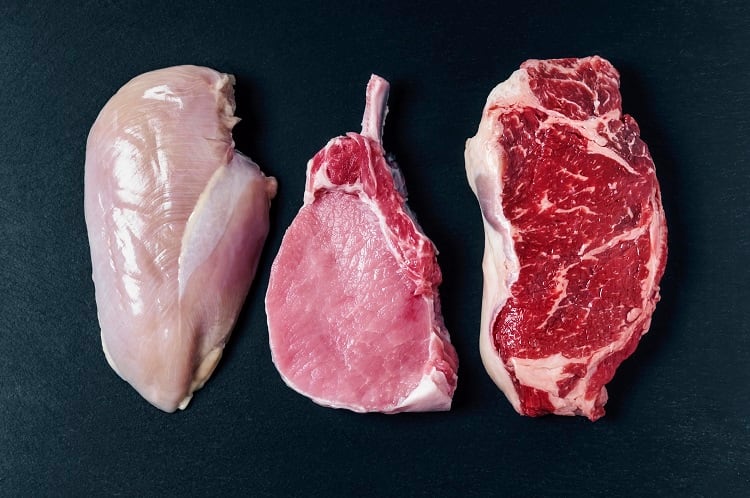Red meat consumption has been linked to cancer, type 2 diabetes, cardiovascular disease, and a higher risk of non-alcoholic fatty liver disease (NAFLD).
Indeed, growing research linking non-communicable diseases with red meat consumption has prompted a number of governments to recommend limiting the amount of red meat consumed per week in their dietary guidelines.
The UK’s Eatwell Guide, for example, advises diets include more beans and pulses, two portions of sustainably sourced fish per week, and “less red and processed meat”. There is less pressure on consumers to do the same with its white counterpart.
In both natural and processed forms, red meat – more so than white meat – is also believed to contribute to high cholesterol. “The general perception has been that in controlling blood cholesterol levels, consuming white poultry meat is preferable to consuming red meat,” professor of medicine at the University of San Francisco, Ronald M Krauss, told FoodNavigator.
However, data supporting this view is “somewhat incomplete”, Krauss continued. In fact, until now, there has been no comprehensive comparison of the effects of red meat, white meat, and plant-based proteins on ‘bad’ low-density lipoprotein (LDL) cholesterol levels. “So our study specifically tested whether consuming equal amounts of red meat and white meat had different effects on blood cholesterol.”
The findings
A clinical trial surveyed 113 participants who ate the three unprocessed, protein diets – heavy in red meat, white meat, and plant-based protein – for four weeks in random order. The red meat diet included lean cuts of beef, with minimal amounts of lamb and pork. The white meat diet comprised of poultry, and the plant-based sources came from vegetable products such as soy-based protein.
Unsurprisingly, the study – known as the APPROACH (animal and plant protein and cardiovascular health) trial – concluded that plant proteins are healthier than red and white meat for blood cholesterol.
What was surprising, however, was that red meat appeared to have no worse effect on ‘bad’ cholesterol than white meat. “We found that the results were exactly the same,” Krauss, who co-authored the study, told this publication. “White meat and red meat both resulted in near identical levels of blood cholesterol.”
Results therefore suggest that limiting total meat consumption – whether red or white – may have a greater impact on lowering blood cholesterol levels than previously believed.
The findings support dietary recommendations to adopt dietary patterns with high vegetable content, but that “do not provide evidence for choosing white over red meat for reducing CVD risk on the basis of plasma lipid and lipoprotein effects”.
Low vs high saturated fat
The clinical trial also included a ‘high-saturated fat arm’ for each diet, taking the total number of diets examined to six. The parallel arm supplemented diets with saturated fat “mostly in the form of full-fat dairy products and butter”, Krauss explained.
Findings suggest that consuming high amounts of saturated fat – whether alongside a red meat, white meat, or plant-based protein diet – increases concentrations of LDL cholesterol levels. “The saturated effects were as expected,” said Krauss. “There was an increase in cholesterol with high vs low saturated fat, and it was nearly identical with all three diets.”

Not a 'one size fits all' approach
Krauss was keen to highlight the variations observed in how participants responded to the diets. “We had 133 people – which for a diet study is pretty large – but the results really represent an average across these people,” he said, suggesting that individual responses revealed “quite a bit of variation”.
People should not necessarily assume that eating more or less white or red meat is going to affect their individual cholesterol levels in the way the scientists reported, he stressed. “Because the average results may or may not apply to a single individual.”
Source: American Journal of Clinical Nutrition
Published online 4 June 2019
“Effects of red meat, white meat, and nonmeat protein sources on atherogenic lipoprotein measures in the context of low compared with high saturated fat intake: a randomized controlled trial”
DOI: 10.1093/ajcn/nqz035
Authors: Nathalie Bergeron, Sally Chiu, Paul T Williams, Sarah M King, Ronald M Krauss.





